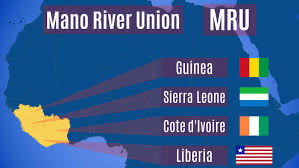By Chibuike Njoku & Ndu Nwokolo
The Mano River region of West Africa, encompassing Liberia, Sierra Leone, Côte d’Ivoire, and Guinea, has endured a tumultuous history marked by protracted civil wars, political instability, and socio-economic challenges. The civil conflicts in Liberia (1989–2003) and Sierra Leone (1991–2002) were particularly devastating, resulting in significant loss of life, displacement of populations, and the destruction of critical infrastructure. In Liberia, the civil war claimed approximately 250,000 lives, while in Sierra Leone, it resulted in about 50,000 deaths. Côte d’Ivoire’s two civil wars (2002–2007 and 2010–2011) further destabilised the region, causing over 3,000 deaths and the displacement of more than a million people. In Guinea, while it did not experience a full-scale civil war, political violence and instability have been persistent issues, undermining democratic institutions and hindering socio-economic development.
These conflicts had far-reaching consequences, extending beyond the tragic loss of human lives to include massive displacement of populations and the destruction of critical socio-economic infrastructure. Millions of individuals were uprooted from their homes, becoming either internally displaced persons (IDPs) or refugees seeking sanctuary in neighbouring countries such as Guinea, Côte d’Ivoire, and Ghana. The displacement crisis exacerbated regional instability, placing immense strain on host communities and overburdening fragile social and economic systems.
The Mano River region’s post-conflict recovery and reconstruction have been complex and uneven, hindered by governance deficits, weak institutions, corruption, and inadequate public service delivery. This edition of the Nextier SPD Policy Weekly analyses these challenges and their impact on sustainable peace and development, especially for Liberia and Sierra Leone. It offers actionable recommendations to address governance gaps, foster inclusivity, and promote lasting stability.
Governance Challenges in Post-Conflict Recovery
Post-conflict recovery in Liberia and Sierra Leone has been hampered by weak institutions. Both countries’ long years of civil war dismantled public administration, leaving governance systems fragile and ineffective. Following its 14-year civil war, Liberia faced significant institutional decay, with government agencies struggling to provide basic services. Essential sectors, such as education, health, and infrastructure, were severely under-resourced. For example, the country still ranks low on the World Governance Indicators (WGI), particularly in the rule of law and regulatory quality. Similarly, Sierra Leone’s civil war devastated state institutions, particularly in rural areas, where the government’s presence remains minimal. Sierra Leone ranked 181 out of 191 countries in the 2021 Human Development Index, but it still struggles with weak institutional frameworks, which hinder policy implementation and governance reforms.
Corruption remains a persistent issue in Liberia and Sierra Leone, undermining public trust in governance. In Liberia, the 2020 Transparency International Corruption Perceptions Index ranked 137th out of 180 countries. A striking example is the 2018 scandal involving the disappearance of $25 million meant for economic stabilisation, which eroded public confidence in government oversight mechanisms. In Sierra Leone, corruption scandals, such as the mismanagement of Ebola response funds in 2014-2015, highlighted systemic issues in financial accountability. This lack of transparency impacts service delivery and fuels perceptions of governance inefficiency, hindering post-conflict reconciliation and peacebuilding efforts.
Security Sector Reform (SSR)
The disarmament, demobilisation, and reintegration (DDR) programs in Liberia and Sierra Leone laid the groundwork for Security Sector Reform (SSR). However, challenges remain in transforming these sectors into effective, accountable institutions. The Liberian SSR program, supported by the UN Mission in Liberia (UNMIL), rebuilt the armed forces and police. Notably, the Armed Forces of Liberia (AFL) underwent a complete restructuring, emphasising professionalism and neutrality. Despite progress, underfunding and logistical constraints continue to limit operational effectiveness. In the case of Sierra Leone, SSR efforts included restructuring the Republic of Sierra Leone Armed Forces (RSLAF) and the Sierra Leone Police (SLP). The International Military Advisory and Training Team (IMATT) was pivotal in rebuilding the military. However, low salaries and insufficient training persist, affecting morale and performance.
One of the critical tensions in SSR is ensuring security while respecting human rights. In Liberia, the police have faced criticism for excessive use of force and corruption, which undermines public confidence. For instance, allegations of human rights abuses during protests highlight the need for greater oversight and training. In Sierra Leone, the 2019 protests in Makeni revealed gaps in the police’s ability to manage civil unrest without escalating violence.
The Mano River region remains acutely vulnerable to a spectrum of transnational challenges threatening its fragile stability—illicit mining, particularly gold and diamonds, compounds these issues. Sierra Leone and Liberia, rich in natural resources, have seen significant illegal mining activities, depleting government revenues and fueling corruption. A 2020 report highlighted that over 70% of gold mined in Sierra Leoneis unreported, costing the country millions in potential revenue annually. This “resource curse” stunts economic growth and exacerbates local grievances, fostering conflict and instability.
Inclusive Governance and Political Participation
Liberia and Sierra Leone’s recovery efforts highlight the importance of inclusive governance systems to prevent political marginalisation. For example, Liberia set a precedent by electing Africa’s first female president, Ellen Johnson Sirleaf. However, structural barriers still hinder women’s participation in decision-making processes. Despite international support for gender-sensitive policies, women in both nations often face cultural and institutional obstacles that limit their role in governance.
Youth unemployment remains a critical issue in the region, with limited job opportunities fueling frustration and potential instability. In Liberia, youth unemployment is estimated at 85%, contributing to social tensions. Sierra Leone’s youth population, which constitutes over 60% of the total population, has been largely excluded from meaningful political participation. Post-conflict programs like Sierra Leone’s Youth Employment Scheme aimed to address this, but political patronage and weak implementation have limited its success.
The region remains at risk of conflict relapse due to unresolved grievances and socio-economic disparities. The failure to fully address the needs of victims, including reparations for those who suffered human rights abuses such as sexual violence and the recruitment of child soldiers, remains a source of grievance. Additionally, the lack of comprehensive Security Sector Reform (SSR) in both Liberia and Sierra Leone has left significant gaps in the capacity of law enforcement and military institutions to maintain order and protect citizens effectively. These unresolved challenges threaten to reignite tensions and destabilise the fragile peace.
Impact of the Conflicts on Sustainable Peace and Development
The protracted civil wars in Liberia and Sierra Leone have left enduring scars on the Mano River region, significantly undermining efforts toward sustainable peace and development. During Liberia’s civil wars, the judicial system collapsed, with courts destroyed, legal professionals displaced, and records lost. Even after the 2003 peace accord, rebuilding efforts have been slow. For example, a 2020 report by the International Crisis Group noted that 62% of Liberians had limited access to judicial services, exacerbating perceptions of injustice and inequality. In Sierra Leone, the war (1991–2002) severely undermined administrative structures, particularly in rural areas. Following the conflict, the government prioritised decentralisation as a recovery mechanism. However, according to a 2019 World Bank assessment, only 40% of local councils in Sierra Leone have adequate capacity to deliver essential services, underscoring the persistent weakness of public institutions.
Liberia’s conflict exacerbated tensions between ethnic groups like the Americo-Liberians and indigenous populations. Post-conflict reconciliation efforts, including the Truth and Reconciliation Commission (TRC), have faced criticism for being politicised. As of 2023, unresolved grievances and perceptions of favouritism in governance remain a source of discontent among marginalised communities.
The conflicts in both countries caused extensive economic damage, crippling the primary sectors of agriculture and mining, which are central to both nations’ economies. Roads, bridges, and markets were destroyed during the wars, cutting off rural producers from urban markets and disrupting trade networks. In Liberia, for instance, the destruction of transportation infrastructure reduced agricultural exports by 50% during the conflict period. In Sierra Leone, rice production, a staple crop, fell dramatically, increasing reliance on imports and food insecurity.
Recommendations
i. Strengthening Governance: Governments should establish digital platforms for anonymously tracking public expenditures and reporting corruption, complemented by workshops to train officials in ethical practices and financial management. Also, it should decentralisedecision-making by granting local governments authority over budgets and development plans. For example, empower municipalities to oversee resource distribution tailored to community needs, enhancing efficiency and inclusivity.
ii. Accelerating Economic Diversification: Establish agro-processing zones and mining cooperatives to enhance local production, create jobs, and reduce dependency on raw material exports. For instance, link cocoa farmers in Sierra Leone to value-added chocolate production chains. Partner with private sectors to create vocational training centres offering skills like carpentry, mechanics, and ICT, targeting ex-combatants for reintegration and reducing unemployment-driven instability.
iii. Enhancing Regional Cooperation: Form cross-border task forces under the Mano River Union (MRU) to tackle arms smuggling, trafficking, and illegal mining, supported by shared intelligence systems and regular coordination meetings. Invest in transport networks, such as cross-border highways and railways, to reduce trade barriers and facilitate regional economic growth backed by public-private partnerships.
iv. Deepening Social Cohesion: Expand dialogue platforms where community leaders and ex-combatants can engage in conflict resolution and trust-building activities. This includes culturally sensitive ceremonies to address grievances. Deploy mobile health units to provide trauma counselling and mental health support in war-affected areas, ensuring accessibility for survivors in remote locations.
v. Investing in Human Capital: Expand mobile clinics and community schools in underserved rural areas to increase access to essential services. Prioritise hiring local staff to build community trust and engagement. Distribute solar-powered tablets with pre-installed educational resources to improve learning in remote areas. Use online platforms to provide vocational training, connecting learners to job opportunities.
Achieving sustainable peace in the Mano River region requires addressing the institutional deficits that hinder governance effectiveness and stability. Decades of conflict in Liberia, Sierra Leone, Côte d’Ivoire, and Guinea have left a legacy of weak institutions, corruption, and inadequate public services. Governance reforms, therefore, must focus on fostering transparency, strengthening accountability, and empowering local authorities to meet the needs of their communities. The interplay between unresolved issues, such as security sector reform, socio-economic inequalities, and regional cooperation, underscores the need for a comprehensive approach to post-conflict recovery. Collaborative governance, supported by anti-corruption measures, decentralised decision-making, and regional partnerships, can address these challenges while promoting inclusive development and social cohesion. Furthermore, investing in human capital, accelerating economic diversification, and addressing cross-border challenges like trafficking and illicit mining will create a foundation for sustained growth and resilience. By prioritising these areas, the Mano River Union and its member states can transition from a history of fragility to a future of peace, stability, and prosperity, benefiting millions of lives across the region.
(Dr. Chibuike Njoku is an Associate Consultant at Nextier, a Senior Research Fellow at the Institute of Advance Studies, Ile-Ife, and a Senior Research Fellow at the Institute Francais De Recherche en Afrique (IFRA-Nigeria); while Dr. Ndu Nwokolo is a Managing Partner at Nextier, an Honorary Fellow at the School of Government at the University of Birmingham, UK, and a Visiting Research Fellow at the Nathanson Centre on Transnational Human Rights, Crime, and Security at York University Canada)



